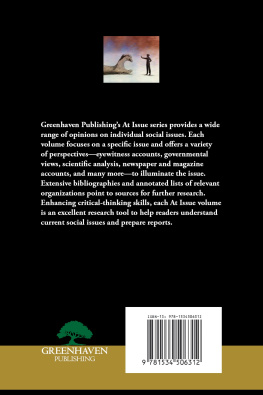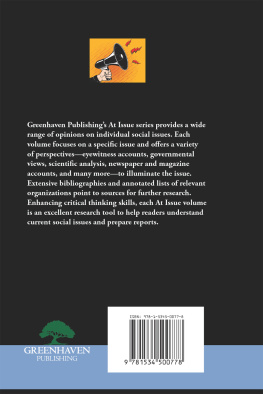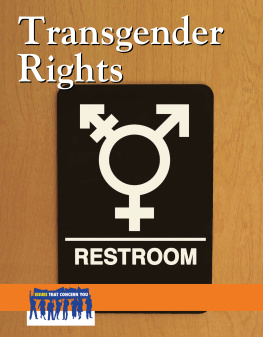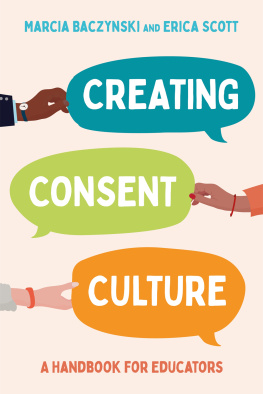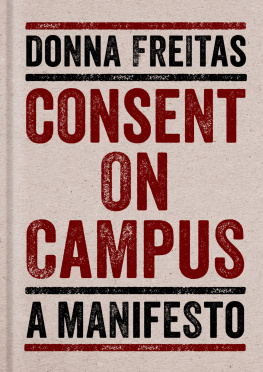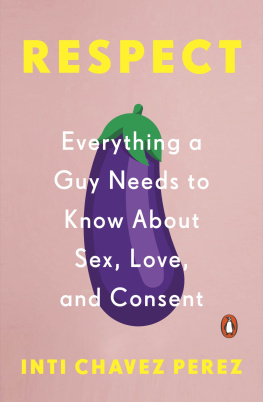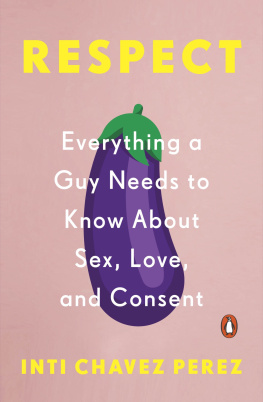

Sexual Consent
Other Books in the At Issue Series
Athlete Activism
Celebrities in Politics
Male Privilege
Mob Rule or the Wisdom of the Crowd?
The Opioid Crisis
Public Outrage and Protest
Student Debt
Universal Health Care
Vaccination
Vaping
Wrongful Conviction and Exoneration
Published in 2020 by Greenhaven Publishing, LLC
353 3rd Avenue, Suite 255, New York, NY 10010
Copyright 2020 by Greenhaven Publishing, LLC
First Edition
All rights reserved. No part of this book may be reproduced in any form without permission in writing from the publisher, except by a reviewer.
Articles in Greenhaven Publishing anthologies are often edited for length to meet page requirements. In addition, original titles of these works are changed to clearly present the main thesis and to explicitly indicate the authors opinion. Every effort is made to ensure that Greenhaven Publishing accurately reflects the original intent of the authors. Every effort has been made to trace the owners of the copyrighted material.
Cover image: Gary Waters/Ikon Images/Getty Images
Library of Congress Cataloging-in-Publication Data
Names: Gitlin, Marty, editor.
Title: Sexual consent / Martin Gitlin, book editor.
Description: First edition. | New York: Greenhaven Publishing, 2020. | Series: At issue | Includes bibliographical references and index. | Audience: Grades 9-12.
Identifiers: LCCN 2019022609 | ISBN 9781534506329 (library binding) | ISBN 9781534506312 (paperback)
Subjects: LCSH: Sexual consent. | Sexual ethics. | Sex and law.
Classification: LCC HQ32 .S397 2020 | DDC 176/.4dc23
LC record available at https://lccn.loc.gov/2019022609
Manufactured in the United States of America
Website: http://greenhavenpublishing.com
Contents
Joseph J. Fischel
Serlo
Reina Gattuso
Alex Aldridge and Adam Winstock
Molly Redden
Alison Saunders
Dr. Lauren Rosewarne
UN Women
Dean Burnett
Kelly Oliver
Denise-Marie Ordway
M. K. Fain
Alesha Durfee
Jesse Rifkin
Dr. Gemma McKibbin
Tovia Smith
Mary Kate Leahy
Paul Gowder
Introduction
I t took famous people to make sexual consent a national issue. It became news when athletes and actors and politicians were accused of making unwanted sexual advances. The every-day people who had been subject to such attacks for centuries received little attention. And that was a terrible shame.
But the publicity generated by sexual abuse accusations against those in the public eye has brought a spotlight to the issue. People have begun talking about it. They have debated what constitutes sexual consent and what does not. Those judged to have attacked or even harassed others sexually have been punished. Men, who have created most of the problem, have started to talk about the rights and wrongs in their potential sexual relationships. And many of them are trying to learn how to behave with more consideration and courtesy.
The issue is a thorny one. The problem of sexual consent leads to many questions that might seem awkward but that must be answered. Some people argue that a proper approach to relationships with a potential sexual partner is just common sense. They state that no means no, plain and simple. But others believe it is more complicated. They assert that sometimes the word no is never spoken and that one would have to be a mind reader to know if a green light toward sexual activity is flashing.
There is indeed a lot of gray area in the discussion that revolves around the following questions: Where is the line drawn between flirting and sexual harassment? What constitutes consent? Once consent is mutually understood, what signals should be given by one partner that the other has gone far enough? Does the use of drugs or alcohol make potential victims any more vulnerable? Does provocative clothing worn by a woman make unwanted sexual advances or presumptions any more justified?
The issue of sexual harassment leaped into the spotlight in 1991. That is when law professor Anita Hill accused United States Supreme Court nominee Clarence Thomas of unwanted sexual advances. The charges resulted in nationally televised hearings in which Thomas denied any wrongdoing. His eventual confirmation to the highest court of the land angered millions of women who believed his guilt had been proven. They also felt his behavior toward Hill suggested that he would not judge womens issues fairly as a Supreme Court justice.
The Thomas case brought a higher level of awareness of how even suggestive sexual talk makes others uncomfortable and can be considered harassment. Once the issue had been thrust into the spotlight, many other incidents that involved the world of politics and entertainment followed. Athletes, singers, actors, and politiciansincluding President Donald Trumpwere accused publicly of sexual harassment, assault, and even rape. Some lost their jobs. Others narrowly escaped. One of the most controversial cases was that of Brett Kavanaugh, another Supreme Court nominee, who was peppered with questions on national television in 2018 about accusations of attempted rape years earlier. He too was confirmed to the highest court in the land.
The Kavanaugh hearing raised another issue involving sexual impropriety. And that revolves around the unwillingness of victims to come forward after an incident, or the amount of time that lapses before charges are made. Many women who claim to have been victims of sexual harassment or assault have hesitated or declined to inform the authorities. Some have felt a sense of shame for what happened to them. Others fear retribution from the attacker. Still others question whether bringing charges will result in any punishment or justice. But many women throughout the world have encouraged victims to make their voices heard. The result was the birth of the #MeToo movement.
Meanwhile, what many believe to be the gray area of sexual consent continues to be discussed and debated. Some claim that potential partners receive mixed signals or even a green light toward sexual advancement. Some perceive a green light to be flashing all the way into the bedroom and do not read accurately when the light has changed to red. Others contend that a red light is easy to read. They assert that one does not need to say words such as no or stop to signal their discomfort over sexual activity.
What had been assumed for years is no longer assumed. Among those assumptions is that women wearing revealing and provocative clothing are more open to sexual advances than others. Or that they are inviting trouble by showing more skin, thereby whetting sexual appetites. But that has proven to be a fallacy. Women around the world have stated plainly that being sexual or dressing in a way that might be called provocative is no excuse for unwanted sexual suggestions or advances.
These issues are explored and answered in At Issue: Sexual Consent. The viewpoints that follow have been written by experts on the subject. They write about consentwhen and how it is given and whether it can be reversed. They write about what constitutes sexual consent and unwanted sexual activity. They write about legal issues involving victims and perpetrators. They write about sexual harassment and assault on college campuses.
Next page
